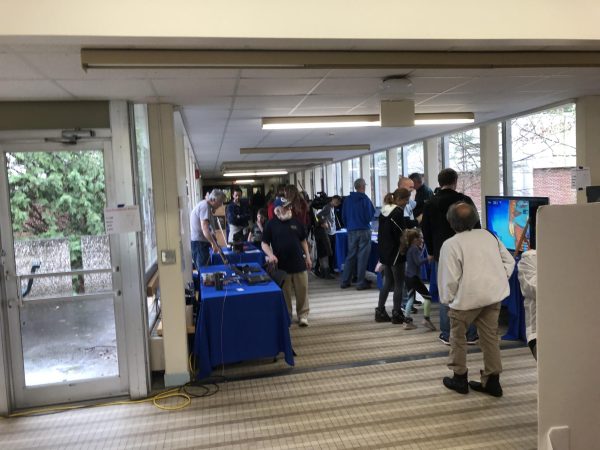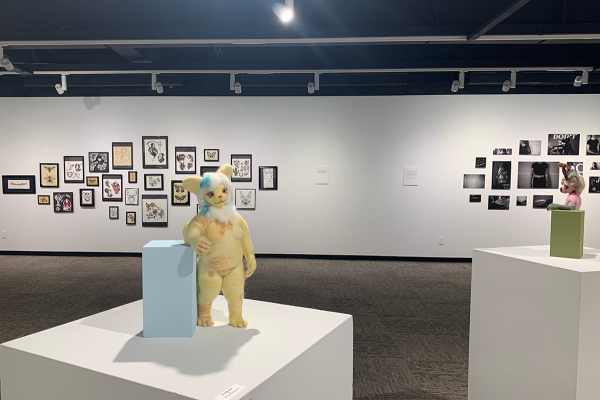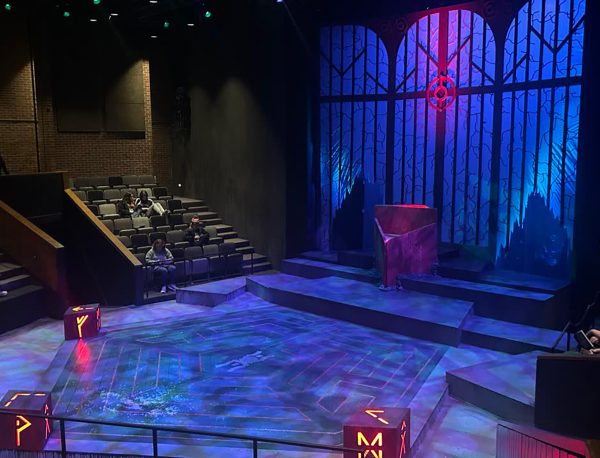Locals celebrate 150 years of the Periodic Table
Faculty and staff came together at the Pablo Confluence Center to celebrate Dmitri’s Dream with poems and other readings

Photo by Owyn Peters
Professors, students and residents of Eau Claire attended the event.
Around 150 years ago, the world was introduced to what some call the alphabet of the world: The Periodic Table of the Elements, thanks to Dmitri Mendeleev.
Dmitri Mendeleev, according to Britannica, was a Russian chemist who developed the periodic classification of the elements of today. In 1871, when Mendeleev was studying the Periodic Table, some of the table was predicted in terms of properties of possible elements that were not yet found, like Scandium and Gallium.
The Pablo Confluence Center hosted an event called Dmitri’s Dream to celebrate the periodic table’s 150th anniversary on Tuesday, Dec. 3.
In the program for Dmitri’s Dream, it said Mendeleev saw a path forward after awakening from a dream back in the 1860s, hence the event’s name “Dmitri’s Dream.”
The program went on to say the dream and its result, the periodic table, changed people’s understanding of how matter is organized and how humans relate to it.
Multiple poems were read by faculty and students of UW-Eau Claire relating to the periodic table in various ways, such as the creation of it or the elements it comprises.
In the program for Dmitri’s Dream, it said the event is a story (they) were going to attempt to tell through history, biography, science, poetry and art.
Some of the poems read were titled “Floating Squares,” “Dreams” and “The Chemist’s Cheat Sheet.”
In one poem — read by Allyson Loomis, an associate professor and reader at the event — called “Woman On The Edge,” it explained how Dmitri Mendeleev’s mother urged him to go to a university. He chose to attend one in St. Petersburg, Russia. The poem went on to tell of the hundreds of miles Mendeleev’s family had to travel by horse carriage to get him to the university.
David Lewis, a chemistry professor and reader at the event, said most people view scientists as being passionless, but this celebration showed the humanity of science and that scientists have souls. He said he enjoyed the chance to work with his friends and students in Dmitri’s Dream.
Lewis said back when the periodic table was first founded, that was really the first time people were able to systemize everything.
“It has guided 150 years worth of science,” Lewis said. “It’s the road map to where we are.”
He said about every 30 to 40 years, the periodic table becomes inadequate due to newly found elements, and has to be redrawn again.
Lewis said the periodic table we know now will guide the next 20 to 30 years in elements.
Paul Thomas, a physics and astronomy professor and reader at the event, said without the periodic table we wouldn’t have many things people utilize and need today, like cell phones and nuclear energy to power lights.
Levi Cavagnetto, a third-year computer science student, said he enjoyed the historical side of the celebration.
“I enjoyed learning more of the historical facts of how the periodic table came to be,” Cavagnetto said.
He said attending the celebration influenced him to want to take a chemistry class in the future.
Dirks can be reached at [email protected].

McKenna Dirks is a fourth-year journalism student and this is her seventh semester on The Spectator staff. She thrives under chaotic environments, loves plants and often gives off "granola girl" vibes with her Blundstone boots.

Owyn Peters is a third-year computer science student, and he enjoys riding bikes, traveling and being outdoors.










